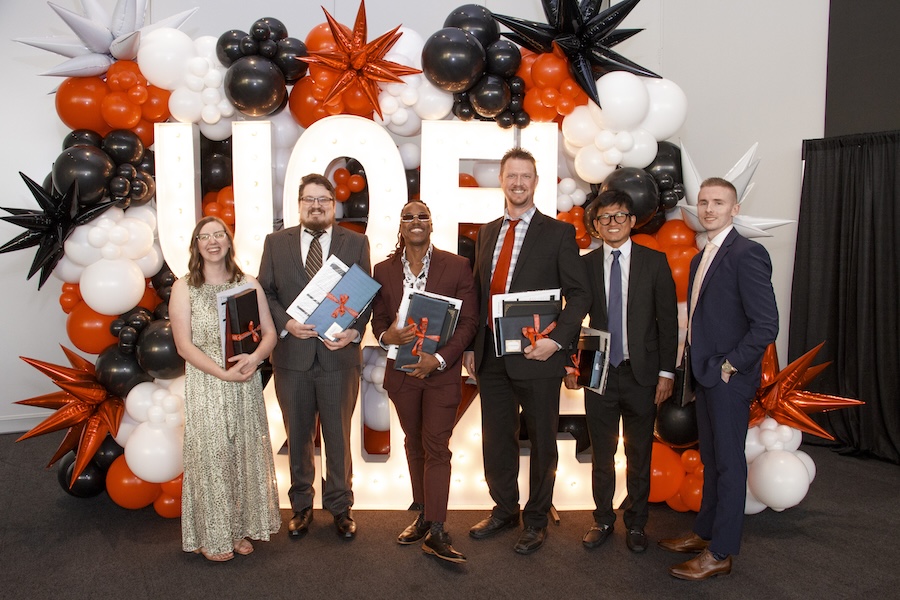Published on July 02, 2025
Family Medicine Residency Program Going Strong After Five Years

By Scott Hagerman, Messenger-Inquirer
Owensboro Health partnered with the University of Louisville on a Family Medicine Residency program that launched in 2020 and produced its third graduating class of six doctors Friday night during a ceremony at the Owensboro Convention Center.
As with the two previous classes, two of this year’s graduates have chosen to practice in the area— Dr. Millie Babbs plans to work at Owensboro Health Family Medicine in Beaver Dam, and Dr.Avery Buckles will work at Owensboro Health Family Medicine in Leitchfield.
Dr. Darby Cole, Owensboro Health Family Medicine Residency director, said that’s the outcomeOwensboro Health was hoping for in offering the three-year program.
“I think it’s worked exactly as intended,” he said. “The entire plan of building a residency program here was that a certain percentage of those graduates would want to stay and join our local medical community and make differences in this area here, particularly these healthcare shortage areas that surround us here in Owensboro. I think it’s done just that. It’s helping fulfill these needs in these healthcare shortage areas around us.
“I think we’re very blessed with that. And even those folks that finished that chose not to stay herein our service area, certainly they’re going on doing great things in America.”
The program allows residents to rotate through various aspects of the hospital, and there is also a continuity clinic within OH”s Family Medicine Center, where they see patients “and make an impact, make a difference in people’s lives,” Cole said.
The program has increased its offerings substantially since it debuted, with it now offering 39elective options after it began with just a small handful. The program was forced to evolve at a fast pace when its accrediting body “rewrote the rules” about three years ago for what it takes to have a family medicine residency program.
“We had to switch from a program that focused on a certain number of experiences and exposures to what we call a competency-based curriculum,” Cole said. “For example, it’s not just that a resident spends a month on a cardiology rotation learning about cardiology, they actually have a requirement to master a certain amount of material before they can move on, no matter how much time they have spent on that particular rotation. So we basically had to change all of the metrics that we were using to judge resident progress and resident success to one that focused solely on competencies.
“It wasn’t about the amount of hours that you worked or the number of patients that you admitted or saw in the office, it was about the quality of care that you delivered and how competent you were at evaluating, handling, managing, treating, etc. That forced a tremendous amount of change in how we do every single rotation, and since Day 1 we’ve developed new rotations, we developed new relationships.”
Cole said having the University of Louisville as a partner is a resource that can’t be overstated.
“The University of Louisville and Owensboro Health, I think, have a really great working relationship,” Cole said. “Some of the expense of the program itself, operational expense, comes from the Owensboro Health side, but U of L contributes so many resources, from guidance on the graduate medical education side, to support for faculty development, mental health services and patient care services for the residents themselves, whether financial planning, medical malpractice guidance, and we have access to the university libraries and university statisticians, and they just contribute so many resources to us.
“It would be really difficult to operate this residency if we didn’t have that, and I think we’re blessed that we have such a good working relationship between the two entities. I feel very blessed in this situation because I get backing and support from both entities.”
Cole said the program has also applied for osteopathic medicine recognition, which comes from the American College of Osteopathic Physicians.
“It is a special degree of certification that says we’re really good at teaching the osteopathic principles and techniques, and that we have a curriculum in place to do that,” he said. “We’ve made it through the first couple of steps, and we anticipate in August that we’re going to hear that we achieved osteopathic recognition.
“What’s noteworthy about that is we will be the first program within U of L’s massive array of programs to achieve osteopathic recognition and only the second program in the state to ever achieve osteopathic recognition.”
About Owensboro Health
Owensboro Health is a nonprofit health system with a mission to heal the sick and to improve the health of the communities it serves in Kentucky and Indiana. The system includes Owensboro Health Regional Hospital, nationally recognized for design, architecture and engineering; Owensboro Health Muhlenberg Community Hospital; Owensboro Health Twin Lakes Medical Center; the Owensboro Health Medical Group comprised of over 350 providers at more than 30 locations; four outpatient Healthplex facilities, a certified medical fitness facility, the Healthpark; a weight management program, and the Mitchell Memorial Cancer Center.
On average each year, we have more than 19,000 inpatient admissions, deliver 2,000 babies and provide the region’s only Level III NICU. Owensboro Health physicians perform nearly 33,000 surgical procedures, including nearly 150 open-heart surgeries. Our physicians and staff have 90,000 Emergency Department visits and more than 1.25 million outpatient visits annually. Visit our home page for more information.